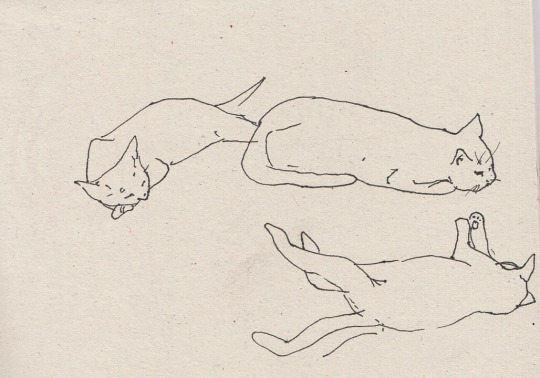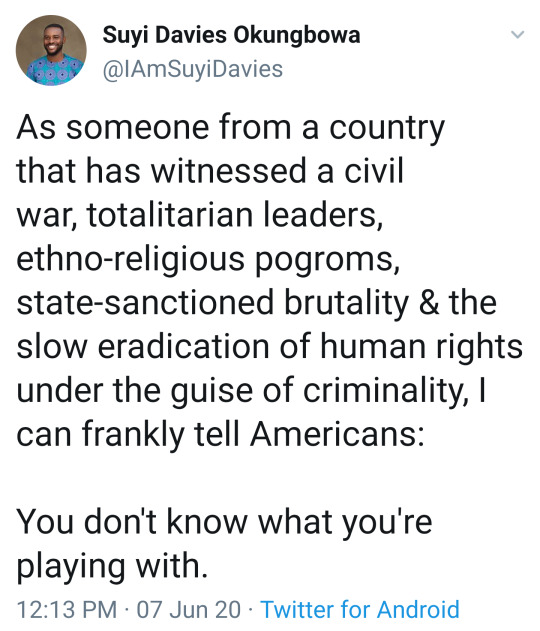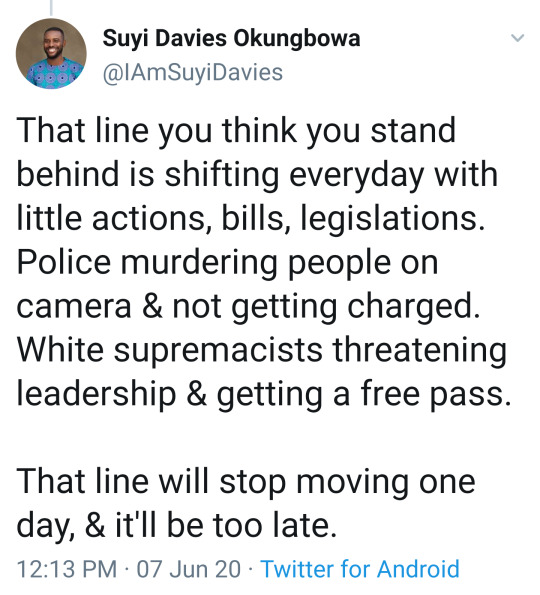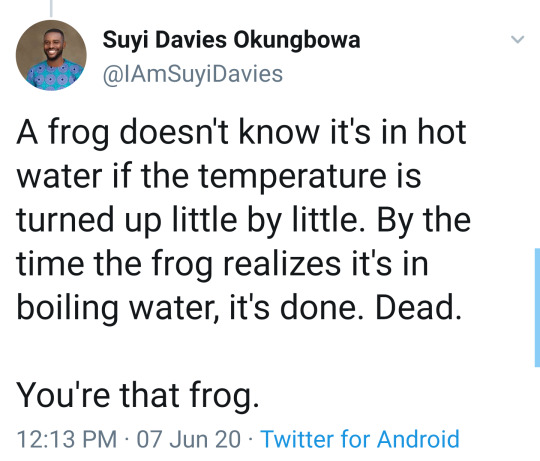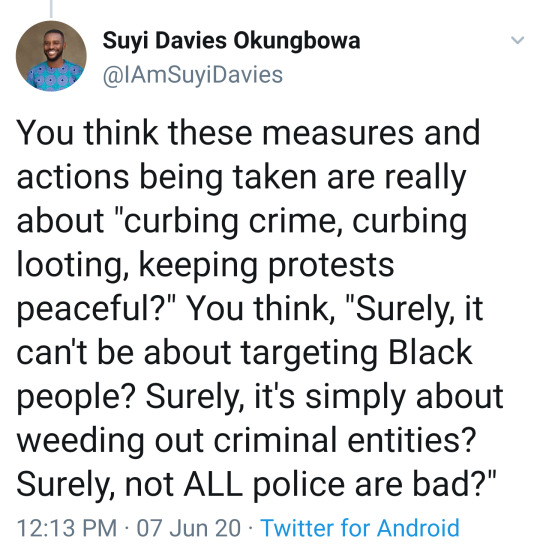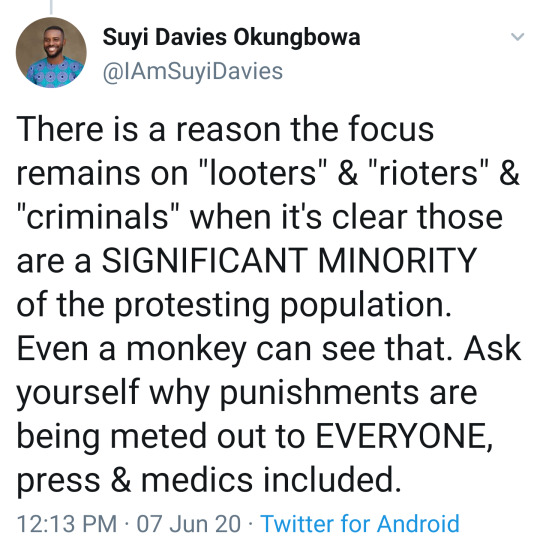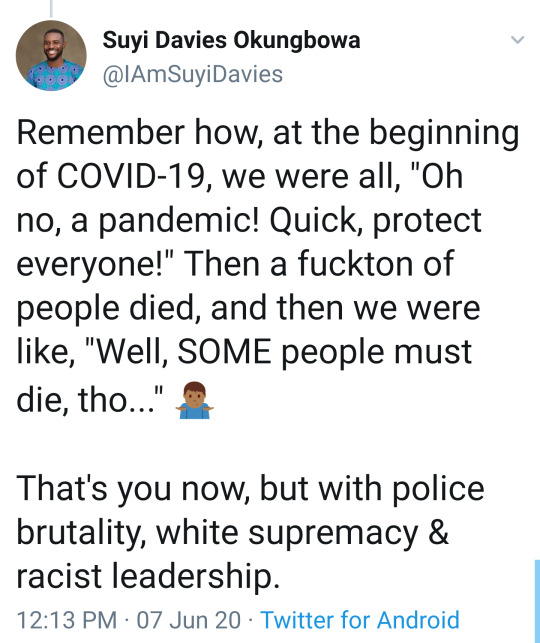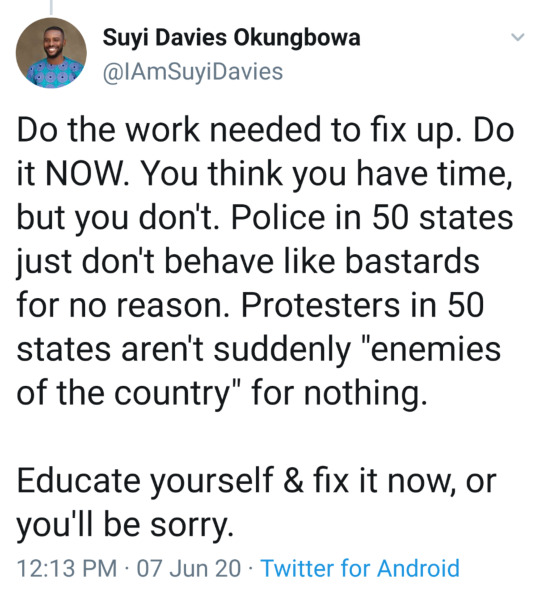🔹INTJ🔹Male🔹36🔹Christian Mystic🔹Zen Buddhist Practitioner🔹 Brace for the Following Content: Storytelling, Philosophy, Zen Buddhism, Christian Theology, Anthropology, Politics, Democratic Socialism, Cats, Free Palestine, Black Lives Matter, The Iliad, Avatar: The Last Airbender, The Lord of the Rings, Welcome to Night Vale.🔹 "The universe is made of stories, not of atoms." - Muriel Rukeyser
Don't wanna be here? Send us removal request.
Text
"THINGS DIDN'T GET INTERESTING UNTIL THE FIRST APOLOGY.
A desperate transgression: charred fish and tubers stolen from an unattended fire. Common enough. Surprise when the expected violent outcome did not materialize. Instead, a bowed head, and a leaking ocular duct signaling earnest remorse. Elsewhen, a conglomeration of dark matter and indifference cocked a proverbial head to the side. Inquisitive, as five digits offered forgiveness, and five more, spare nutriment.
At some point a bone broke. Common enough. Expected outcome of abandonment, isolation, fear, death. But surprise, again. The apes gathered the infirm, tending to them enough for osteoblasts to execute their programming. Calcification, returned strength. Two legs ran with twenty more. Something had changed. Elsewhen, dark matter and curiosity leaned in to observe.
One summer, the apes theorized that teosinte could be more bountiful and nutritious if they sowed seeds from a past crop that yielded a particularly desirable result. Unexpected ingenuity. Everything they touched they sought to optimize. Elsewhen, dark matter and pride did smile.
Eyes looked at the flocculent quadruped and saw friendship instead of obedience. The first time a hand reached out to rub fingers over soft, floppy ears, the dark matter felt an unfathomable tenderness.
They made noises with their mouths simply because the sounds made others laugh. They held one another to process emotions their small, frail bodies could not bear to feel alone. They celebrated each time one of their own lived to see another orbit.
They, the children of Earth. They, the children of my Earth. Created and pondered and explored and played just because they could. And I, the dark matter, watched them in wonder."
- from the Destiny 2 seasonal artifact description, the Implement of Curiosity.
#it's a messy relationship but destiny 2 is the video game i keep coming back to#quote#quotations#wholesome goodness#human nature#anthropology#science fiction#sci fi#storytelling#destiny 2#creative writing
4 notes
·
View notes
Text
"In the face of creeping authoritarianism following decades of bipartisan failure to address skyrocketing inequality, many Americans are urgently asking ourselves what kind of society we truly want to live in. Ultimately, that is the question at the root of all the policies I examined, from Singapore to New Zealand and Estonia to Costa Rica. Do we want to live in a society like Singapore, where housing is a right? How about Norway, where working families can count on guaranteed government support to raise their children? Or Finland, where everyone can count on receiving the best possible education in their neighborhood school? Or New Zealand, where people can age without fear of destitution? Or Estonia, where public services and direct democracy initiatives have been made universally accessible online? Or Portugal, where addiction is treated as a public health issue rather than a criminal one? Or Uruguay and Costa Rica, where clean energy and biodiversity protections safeguard the planet that humans and so many other species depend on? Or the United Kingdom, where healthcare is a universal right?
America is not working for the majority of us. We struggle to pay healthcare and childcare costs, we can’t afford to buy our own homes, we are caught off guard by rising energy costs, we are getting sick from the lack of clean air and water, we’ve lost loved ones to opioids and other drugs, we’ve watched many of our public schools fail our children, we cannot access public services (thanks in part to what Jacobin’s Meagan Day calls 'austerity by paperwork'), we cannot survive on inadequate Social Security payments, and we’re anxious about the climate crisis that threatens to engulf our planet. Instead, America is working for a tiny superrich minority that amassed its wealth on the back of our collective labor — and our collective impoverishment...
Profound societal change often begins in moments of deep crisis. In Britain, the National Health Service was born from the bloodstained devastation of World War II. Portugal’s radical drug reforms arose from the desperation created by dual epidemics unlike any the country had seen. Estonia, Finland, Singapore, and Norway all designed their own policies in the midst of financial crises that required them to reimagine the very foundations of their economies. Faced with environmental devastation, Uruguay and Costa Rica found ways to tackle the climate and biodiversity crises head on. All these historically difficult periods had one thing in common: they forced their citizens not just to hope for better but to work toward better, and people in these countries took it upon themselves to do so.
Rather than raise our hands in surrender as we face this avalanche of problems — problems that seem to multiply by the minute under the second Trump administration — we must look to these examples and take heart. The lesson is crystal clear: some of the most effective and longest-lasting solutions are forged in the darkest of times as we look up from the pits of despair and envision a way out. More importantly, it’s at times like these that we learn how not to fall back in."
- Natasha Hakimi Zapata, from "Searching the Globe for Answers to America’s Thorniest Problems." Current Affairs, 7 July 2025.
#a better world is possible#natasha hakimi zapata#quote#quotations#domestic policy#us politics#problem solving#current events#income inequality#wealth gap#healthcare#activism#fascism#austerity
8 notes
·
View notes
Text

trying some new things
63 notes
·
View notes
Text
there's no such thing as a medicaid freeloader. everyone needs healthcare. it does not matter if you don't believe someone has a valid reason to not be working or in school- they are still a human being and human beings need healthcare. even if someone IS this strawman ""just lazy"" unemployed person, they deserve healthcare. sorry but i do not believe that the right to medical treatment without financial ruin is predicated on someone's "usefulness" to society. it's depressing that this is apparently too radical a belief.
16K notes
·
View notes
Text
#you may now fill in the 'northern irish rap music' square on your bingo card#free palestine#kneecap#mozey#rap music
1 note
·
View note
Text
"After so many disappointments, the heart hardens, belief becomes elusive. And when we no longer believe in our democracy, it only becomes easier for people like Donald Trump to convince us of his worth. For billionaires to convince us that they must always lead.
As Franklin Delano Roosevelt said, 'Democracy has disappeared in several other great nations. Not because the people dislike democracy, but because they had grown tired of unemployment and insecurity, of seeing their children hungry while they sat helpless in the face of government confusion and weakness. In desperation, they chose to sacrifice liberty in the hope of getting something to eat.' New York, if we have made one thing clear over these past months, it is that we need not choose between the two.
We can be free and we can be fed. We can demand what we deserve. And together, we have built a movement where every day, New Yorkers recognize themselves in our vision of democracy. Every new voter registered. That is faith renewed.
Every voter who traveled through withering heat to the polls — that is faith renewed. And every New Yorker who sees solutions to the daily challenges they face in this campaign — that is faith renewed. Together, New York, we have renewed our democracy. We have given our city permission to believe again.
And I pledge to you that we will remake this great city not in my image but in the image of every New Yorker who has only known struggle. In our New York, the power belongs to the people...
We dreamt in the night. And we are now building in the dawn. That new day, the one that we have yearned for, the one that we have struggled for. The one that we have knocked for, have texted for, have called for. The one that we have obsessed over. That new day is finally here. And it is here because you have delivered it."
- Zohran Mamdani, from his Democratic Party nominee victory speech. Jacobin, 25 June 2025.
#bread and roses#zohran mamdani#quote#quotations#new york city#us politics#democracy#democratic socialism#political organizing#franklin delano roosevelt
24 notes
·
View notes
Text
"One reason there is a lot of repetition in oral performance, as in ordinary speech, is the need for redundancy. The reading eye can turn back and reread and make certain; therefore, in writing you need only say a thing once, if you say it well. So we writers are taught to be afraid of repeating ourselves, to shun even the appearance of repetition. But in speaking, words go by very quickly and are gone; they fly away, they are wingéd words. Speakers know that they may need to bring the whole flock back round again more than once. Orators, reciters, storytellers shamelessly say the same thing several times, maybe varying the words maybe not. Redundancy is not a sin in oral performance, as it has become in writing, but a virtue.
Speakers also use repetition because it is the best device they have to organise, to shape and structure, what they are saying. Experienced listeners in an oral culture — such as a three-year-old who gets read to or told stories a lot — expect repetition. They wait for it. Repetition both raises expectations and fulfills them. Minor variation is expected, but extreme variation, though it adds surprise, which may be welcomed, more likely will be rejected as frivolous or corrupt. Tell it the right way, Mama!
Repetition may be of a single word; of a phrase or sentence; of an image; of an event or action in the story; of a character’s behavior; of a structural element of the piece.
Words and phrases are the most likely to be repeated verbatim. The simplest example of this is starter words, words used to begin a sentence. In the King James Bible, it’s And. And the Lord smote the idolaters. And the idols were destroyed. And the people lamented in the streets. — In a Paiute story, a lot of sentences begin with Then — yaisi in Paiute. Then Coyote did this. Then Grey Wolf said this. Then they went in. — And and Yaisi are key sounds, cues to the listener that a new sentence, a new event, is under way; also they may provide a tiny mental resting place for the teller or reader of the story. These repeated starter words provide a beat, not a regular, metric beat, because this isn’t poetry, it’s narrative prose, but just the same a beat at intervals: a pulse that follows a pause, a sound that follows a silence.
In spoken narrative, silence plays a huge active part. Without silence, pauses, rests, there is no rhythm. Only noise. Noise is by definition meaningless, sound without significance. Significance is born of the rhythmic alternation of void and event — pause and act — silence and word. Repeated words are markers of this rhythm, drumbeats to which the story dances.
For centuries, those huge poems the Iliad and the Odyssey did not exist in writing but only in oral performance. The version we have is the one that happened to get written down. We know now that a tremendous proportion of the language of the epics consists of stock phrases, repeatable terms, used where they were needed to fill out the meter or to take up slack while the performer thought of what Achilles or Odysseus did next. No performer could possibly remember the whole thing verbatim. Every performance was half recital and half improvisation, using that vast stock of ready-made phrases. So the wine-dark sea and rosy-fingered dawn are little metrical bricks, fitted in wherever the hexameter fell short. They are also, of course, beautiful images. Does it lessen them that they are repeated where the meter needs them? Do we not in fact greet their repetition with pleasure, as we do the repetition of a musical phrase or motif in a sonata or symphony?
Repeated actions in oral narrative are essential structural elements. They are usually varied, partial repetitions, building up expectation towards fulfillment. The first son of the king goes out and behaves badly to a wolf and the dragon eats him. The second son of the king goes out and behaves badly to a deer and the dragon eats him. The third son of the king goes out and rescues the wolf from a trap, frees the deer from a snare, and the wolf and the deer tell him how to kill the dragon and find the princess, and he does, and they get married and live happily ever after.
As for repeated behavior of characters, contemporary novelists are likely to consider predictability to be a fault, a flaw, in their invention. Repeated or predictable behavior, however, is what constitutes a character — in life or novels. If it’s highly, obviously predictable, the character is a stereotype or caricature; but the gradations are endless. Some people find all Dickens’s characters mere stereotypes. I don’t. When Mr. Micawber says 'Something is certain to turn up,' the first time, it’s insignificant; the second time, it’s revealing; by the third or fourth time he’s said it in the teeth of total financial disaster, it’s significant and funny; and by the end of the book, when all his hopes have been savagely defeated, 'Something is certain to turn up' is both funny and profoundly sad.
I use an example from literature, not from oral texts, because Dickens’s relationship to orality and oral performance is very close, maybe closer than any other novelist since 1800 except, possibly, Tolkien. The repetitive behavior of Dickens’s characters is more characteristic of oral narrative than of the novel in general. Delicate probings into the convolutions of the private psyche in a unique situation aren’t well suited to tales told aloud. Characters of oral narratives may be vivid, powerful, worthy of a great deal of thinking about: Achilles, Hector, Odysseus, Roland and Oliver, Cinderella, the Queen and Snow White, Raven, Br’er Rabbit, Coyote. They are not one-dimensional; their motivations may be profoundly complex; the moral situations they are in are of wide and deep human relevance. But as a rule, they can be summed up in a few words, as characters in novels cannot. Their name may even be exemplary of a certain kind of behavior. And they can be summoned into the hearer’s imagination by the mere mention of characteristic behavior: Then said wily Odysseus, thinking how to save himself . . . Coyote was going along and he saw some girls by the river. . . . We’ve heard about Odysseus being wily. We’ve heard about Coyote seeing some girls. We know, in general, what to expect. Odysseus will get away with it, but at a cost; he will be damaged. Coyote won’t get away with it, will be made a complete fool of, and will trot away perfectly unashamed. The storyteller says the name Odysseus, or the name Coyote, and we the listeners await the fulfillment of our expectations, and that waiting is one of the great pleasures life offers us."
- Ursula K. Le Guin, from The Wave in the Mind: Talks and Essays on the Writer, the Reader, and the Information, 2004.
#ursula k. le guin#quote#quotations#storytelling#oration#rhetoric#speech#listening#oral traditions#anthropology#the iliad#the odyssey#repetition#charles dickens
17 notes
·
View notes
Photo

https://www.facebook.com/thetilesoflisbon
© Pedro Vilaverde
3K notes
·
View notes
Text
"Sound signifies event. A noise means something is happening. Let’s say there’s a mountain out your window. You see the mountain. Your eyes report changes, snowy in winter, brown in summer, but mainly just report that it’s there. It’s scenery. But if you hear that mountain, then you know it’s doing something. I see Mount St. Helens out my study window, about eighty miles north. I did not hear it explode in 1980: the sound wave was so huge that it skipped Portland entirely and touched down in Eugene, a hundred miles to the south. Those who did hear that noise knew that something had happened. That was a word worth hearing. Sound is event.
Speech, the most specifically human sound, and the most significant kind of sound, is never just scenery, it’s always event.
Walter Ong says, 'Sound exists only when it is going out of existence.' This is a very complicated simple statement. You could say it also about life. Life exists only as it is going out of existence.
Consider the word existence, printed on a page of a book. There it sits, all of it at once, nine letters, black on white, maybe for years, for centuries, maybe in thousands of copies all over the world.
Now consider the word as you speak it: 'existence.' As soon as you say 'tence,' 'exis' is already gone, and now the whole thing’s gone. You can say it again, but that is a new event.
When you speak a word to a listener, the speaking is an act. And it is a mutual act: the listener’s listening enables the speaker’s speaking. It is a shared event, intersubjective: the listener and speaker entrain with each other. Both the amoebas are equally responsible, equally physically, immediately involved in sharing bits of themselves. The act of speaking happens NOW. And then is irrevocably, unrepeatably OVER.
Because speaking is an auditory event, not a visual one, it uses space and time differently from anything visual, including words read on paper or on a monitor.
'Auditory space has no point of favored focus. It is a sphere without fixed boundaries, space made by the thing itself, not space containing the thing.' (Ong)
Sound, speech, creates its own, immediate, instantaneous space. If we shut our eyes and listen, we are contained within that sphere.
We read printed on a page, 'She shouted.' The page is durable, visible space containing the words. It is a thing not an act. But an actor shouts, and the shout is an act. It makes its own, local, momentary space.
The voice creates a sphere around it, which includes all its hearers: an intimate sphere or area, limited in both space and time.
Creation is an act. Action takes energy.
Sound is dynamic. Speech is dynamic — it is action.
To act is to take power, to have power, to be powerful.
Mutual communication between speakers and listeners is a powerful act. The power of each speaker is amplified, augmented, by the entrainment of the listeners. The strength of a community is amplified, augmented by its mutual entrainment in speech.
This is why utterance is magic. Words do have power. Names have power. Words are events, they do things, change things. They transform both speaker and hearer; they feed energy back and forth and amplify it. They feed understanding or emotion back and forth and amplify it."
- Ursula K. Le Guin, from The Wave in the Mind: Talks and Essays on the Writer, the Reader, and the Information, 2004.
#ursula k. le guin#quote#quotations#oration#rhetoric#words#speech#listening#communication#sound#walter ong
7 notes
·
View notes
Text

Lisa Wright (British, b. 1965)
Beneath the Strangeness of it, 2020
Oil on canvas
9K notes
·
View notes
Text

Shakespeare, Henry V (Act Four, Scene One)
87 notes
·
View notes
Text

A page from Anthology of Persian Poetry, Timurid, c. 1450, made of ink, gold leaf, opaque watercolor, silver leaf, book bound by leather. MET
868 notes
·
View notes
Text
I laugh at the cowardly ICE agents. There’s a reason people are yelling at you, man. It’s because you’re being a fucking asshole. Do you know what would constitute bravery? Saying, 'No, I am not going to carry out this grotesque and racist government assault on its citizens, because I know it is unjust.' That would be brave. Saying 'no.' Putting on your bulletproof vest and breaking up families and shrugging and saying 'just following orders' and hiding your face is the most weak-ass thing I can imagine. 'I’d rather destroy the lives of entire families than have the fellas make fun of me. I’d rather tear mothers away from their children than get a regular job.' Go fuck yourself man. Because nobody cool is ever going to fuck you. That, I guarantee. Keep on dreaming.


From here.
More from the piece here but Read the Whole Entry and subscribe to the Substack.







#ridiculing fascists is always morally correct#LA protests#toxic masculinity#fascism#police state#police violence#acab#fuck ice#us politics
13K notes
·
View notes


